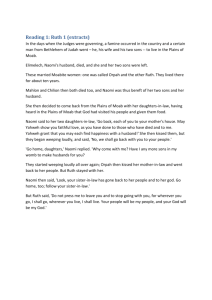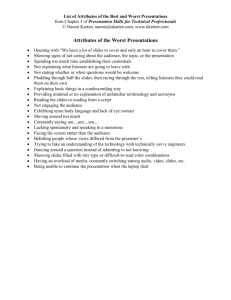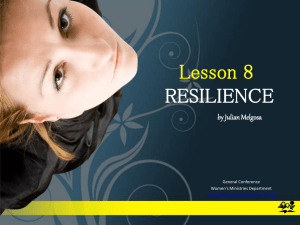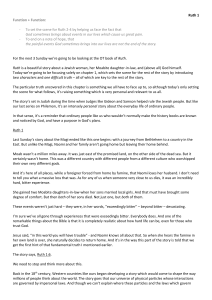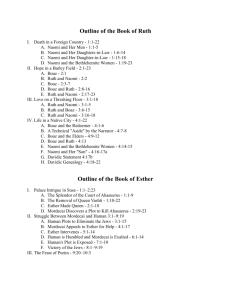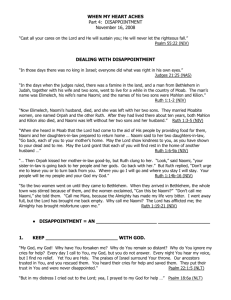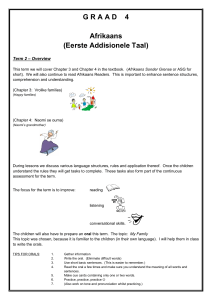Ruth2
advertisement
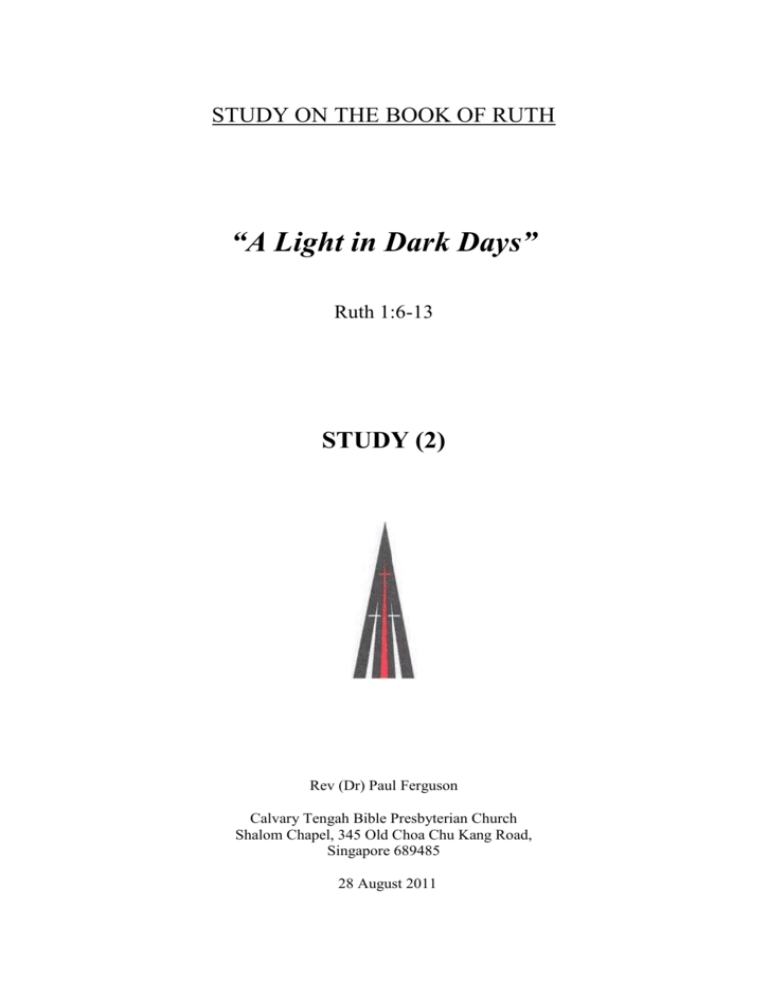
STUDY ON THE BOOK OF RUTH “A Light in Dark Days” Ruth 1:6-13 STUDY (2) Rev (Dr) Paul Ferguson Calvary Tengah Bible Presbyterian Church Shalom Chapel, 345 Old Choa Chu Kang Road, Singapore 689485 28 August 2011 “A LIGHT IN DARK DAYS” – A Study of the Book of Ruth (Ruth 1:6-13) The early part of the book of Ruth is one of the saddest stories in the Bible. It is an account of a frowning providence working through the disobedience of an Israelite family. Naomi had left Bethlehem with such high hopes a decade previously “full” but now she is coming home “empty.” Her dreams had been shattered in the despair of Moab. Naomi’s Hebrew name means “pleasant” but under the chastisement of God life would be bitter to her soul. Disobedience is the root cause of much of the sorrow that comes upon the people of God. Elimelech and Naomi went willingly to Moab, as they were not forced to do so. They were not prepared to pray “give us this day our daily bread.” We read nowhere in scripture of anyone dying from this famine. They left the land given them by Jehovah, turned their backs on the people of God, and moved their family to a land of idolatry and immorality seemingly for a “better life.” Robert Robinson described this tendency well when he wrote, “Prone to wander, Lord I feel it Prone to leave the God I love.” Like Lot heading to Sodom the grass there may have looked greener on other side, but it had a bitter harvest. Famine may not have followed them but death did. Three tombs of triple sorrow testify to the folly of a decision made without reference to the will of God. Elimelech and Naomi’s family resemble us more than we care to think. Too often we try to shortcut the will of God for our lives and suffer the painful consequences. As one writer said, “A change of circumstances will not necessarily solve our problems. We think if we had a new home, a new church, a new husband or wife, a new minister, or a new job, that all our difficulties would be over. As Christians, every major decision we make ought to be set against God’s perfect will. We owe it to God to bring Him into our decision making. Otherwise we may find we have gained economically but lost out spiritually.” Then she arose with her daughters in law, that she might return from the country of Moab: for she had heard in the country of Moab how that the LORD had visited His people in giving them bread. (v6) The narrative slows down considerably from v1-5, which covers a decade or more in just a few verses. Naomi is now a widow in a strange land with no obvious provider for her and nowhere where she can turn to worship Jehovah. She is sorrowful, lonely, aged, childless, and impoverished with probably little hope of remarriage. Foreign widows in Moab would have had no social security to provide for their needs so her plight is a desperate one. Her future there would be merely eking out an existence from day to day. The only hope is to swallow her pride and to return back. It seems Bethlehem had repented, but would the remnant of the prodigal family in Moab also repent? At this point of despair Naomi makes the decision to return to the place that she never should have left. Despite her failures and wrong decisions in this book, it must be seen that 2 she at least desires to return to the place where she had left the Lord and her people. Her decision is prompted by the news that, “the LORD had visited His people in giving them bread.” (v6) This is the first mention of God’s covenant Name “Jehovah” and sparks the first ray of hope in this dark narrative so far. This is surely the type of situation that Solomon contemplated when he wrote, “As cold waters to a thirsty soul, so is good news from a far country” (Proverbs 25:25). We are not told how she hears about this but God has a multitude of ways to inform His elect people of His blessings. Naomi understands the spiritual significance of this visitation necessitating the end of famine. Thank God she has enough faith to believe it and act upon it. She is cognisant that it is not “good luck,” but tied up in the providential workings of a Sovereign God. The Lord was still with her and her people as she walked through the valley of the shadow of death (Psalm 23:4). God had not run away but Naomi had. Likely Naomi would have perished in Moab if God had not intervened here. If she had fled to Edom or Ammon there was also no hope there. She needed to go to the land where God had ordained her to be in His will. This awakening providence news is truly “the goodness of God” leading this prodigal “to repentance” (Romans 2:4). Was Naomi listening for this in the descending gloom of Moab? At least she has not done what Job’s wife recommended and cursed God and died. However, she still suffers the loss of the blessing of Bethlehem. As Lyle observes, “Is it not sad when people only hear about God’s blessing, but never experience it, because they are not in the place where God can bless them?” It was no accident that there was a famine in the first instance and it is no coincidence that Naomi’s family had suffered this tragedy or that there is now bread in Bethlehem. God’s providence is working on her behalf to bring her home, where He wants her to be for His redemptive Messianic plan. Our Sovereign God is so wise that He can work not only in spite of our sin, but amazingly even through it. Sometimes God has to take everything that we hold dear over Him before we find grace at the bottom of the barrel. However, the wise and loving God only removed from her what was necessary to lead Naomi to repentance. God’s chastisement is not to destroy us but to change us. Grace then delights to restore us with great blessings in God’s perfect will. Wherefore she went forth out of the place where she was, and her two daughters in law with her; and they went on the way to return unto the land of Judah. (v7) The first step is always the hardest and not all will make it the whole way back. Naomi is bearing the burden as leader of this home of loneliness, tears and anxiety for three widows. Some commentators point out that it is an Eastern tradition for family members to accompany a beloved loved one part of a journey as they move to another location. This may be what is happening here. As Naomi contemplates the return to Bethlehem, she is in a dilemma as, (1) Budget tight as a widow, but now she has two potential extra mouths to feed. (2) She knows the Israelites would not easily accept Moabite women, especially the prospect of intermarrying with them when they brought “bad luck” to their first husbands. It is a pity that she did not act so wisely in preventing her sons’ marriages in the first instance. 3 (3) Every time she would look upon the Moabite faces of her daughters-in-law in Bethlehem it would be a reminder to her of her sin and its consequences. It would also remind her neighbours that this family had broken God’s law on intermarriage with pagan nations. In fact, a Moabite was not to be allowed in the congregation of Israel even to the tenth generation (Deuteronomy 23:3). And Naomi said unto her two daughters in law, Go, return each to her mother’s house: the LORD deal kindly with you, as ye have dealt with the dead, and with me. The LORD grant you that ye may find rest, each of you in the house of her husband. Then she kissed them; and they lifted up their voice, and wept. (v8-9) Naomi decides that it would be for the better for her daughters-in-law to go back to Moab. There is no mention of prayer or seeking guidance from the Lord for this decision. She does not attempt to witness to them about positive reasons for coming to Bethlehem and seeking the God of Israel as their God. Ultimately it seems that in these exchanges she has no real concern for their souls. This is starkly revealed in her statement to Ruth when she acknowledges their spiritual ruin in Moab as she admitted, “thy sister-in-law is gone back unto her people, and unto her gods” (v15). Bearing in mind the appalling cruelty and immorality of the Moabite worship, which included child sacrifices, this does not reflect well on Naomi. It proves as Lyle says, “It’s dangerous to listen to the advice of a backslidden believer. In fact, a backslidden believer can do more damage than an unsaved person.” Yes it is true from a human perspective that these young women had better marriage prospects in Moab, but we are not to view circumstances merely from a horizontal perspective. For surely a widow in Israel exposed to the written Law of God and the people of God is always better spiritually than married to a pagan in an immoral and idolatrous land like Moab. We should drive people to the Lord not away from Him. Naomi is still judging circumstances in the wisdom of the flesh i.e. what is best materially. This thinking is what got her whole family in the mess the first time! Grant points out about Naomi, “But she was like so many believers who get away from the Lord. They do not encourage others to come to where the Lord is because they think there is nothing there to attract them! They are thinking of the circumstances rather than of the Lord Himself…. Did she think she must be their only resource in Israel? But faith becomes extremely weak when one has backslidden.” Naomi is very direct by advising “go” but she does at least add a blessing for their kindness to her, “the LORD deal kindly with you, as ye have dealt with the dead, and with me.” (v8) It is good to acknowledge the grace others have shown you. These were clearly honourable young women in many ways – even Gentiles have the law of God written on their hearts (Romans 2:15-16). Naomi seems to truly have genuine affection for these girls and they for her as they weep much at the proposed parting. She prays a blessing of another family for them, “The LORD grant you that ye may find rest, each of you in the house of her husband.” (v9) Sadly, there is no mention of praying for their salvation but her prayer just concerns material “rest” with a new husband. Her attitude should have been that of Moses to his relatives, “And Moses said unto Hobab, the son of Raguel the Midianite, Moses' father-inlaw, We are journeying unto the place of which the LORD said, I will give it you: come thou 4 with us, and we will do thee good: for the LORD hath spoken good concerning Israel.” (Numbers 10:29) Furthermore, it is not true that there was no hope for strangers living in Israel. Naomi clearly knew Jehovah by her conversations with her daughters-in-law and her later conduct demonstrated that she knew the Mosaic law in respect of the kinsman redeemer. She must therefore have known that Moses commanded Israel to show compassion to foreigners like Ruth and Orpah, “the stranger, and the fatherless, and the widow, which are within thy gates, shall come, and shall eat and be satisfied; that the LORD thy God may bless thee in all the work of thine hand which thou doest” (Deuteronomy 14:29). And they said unto her, Surely we will return with thee unto thy people. And Naomi said, Turn again, my daughters: why will ye go with me? are there yet any more sons in my womb, that they may be your husbands? Turn again, my daughters, go your way; for I am too old to have an husband. If I should say, I have hope, if I should have an husband also to night, and should also bear sons; Would ye tarry for them till they were grown? would ye stay for them from having husbands? (v10-13a) Naomi tried the pleasant and emotional appeal first to these young ladies. When this does not seem to work she becomes very direct and coldly rational. It is as if she is saying “don’t be foolish you need to help yourselves first by your own methods independent of God.” It seems that Naomi is doing everything she can to keep Orpah and Ruth from coming back with her as: (1) She implies that it is impossible for any Israelite man to consider being a kinsman redeemer to them. The later chapters prove that such a pessimistic view was unfounded. (2) She makes it clear that it would be impracticable for them to marry any sons she could ever bear. nay, my daughters; for it grieveth me much for your sakes that the hand of the LORD is gone out against me. (v13b) One thing that should be noted in Naomi’s favour here is that she is willing to acknowledge the Hand of Providence in her trial and circumstances, “the hand of the LORD is gone out against me.” She believes that the tragic events that had transpired were not by chance. The bitter pill she had to swallow was from Him. She is aggrieved with her circumstances but she attributes no blame to the Lord for what He has done in her life. Naomi may be embittered and backslidden but she never hints in this book that she stopped believing in Jehovah. Certainly she never imbibed the polytheism of the Moabites nor their belief in localized gods. Naomi is also willing to accept and is grieved that it was her sin that caused these two women to suffer in this manner, “for it grieveth me much for your sakes.” As Boone commented, “Had Naomi stayed in the land of Bethlehem, it might have spared Orpah and Ruth many sorrows, and, likewise, if people would remain in fellowship and relationship with GOD, it might spare them and others of their family much distress and grief.” 5 Another factor that she should be commended for is her willingness to testify of her faith in Jehovah to her pagan daughters-in-law. Naomi is not ashamed to bring the Lord into her conversations and use His name to pray blessings on others. It is true she is at times inconsistent in her belief and practice but she does shine her faith throughout, albeit imperfectly. Though she had left the Lord, He had not left her. That said, it is worth noting that Naomi never prays for herself in all these exchanges. She does not say, “May the LORD deal kindly with us.” It may be suggestive that she has given up on God’s mercy and love towards her for her sin. She still believes in Jehovah’s power and reign, but is still doubting His eternal love and faithfulness to her personally. Piper comments, “When we have decided that God is against us, we usually exaggerate our hopelessness. We become so bitter we can’t see the rays of light peeping out around the clouds. It was God who broke the famine and opened the way home (1:6). It was God who preserved a kinsman to continue Naomi’s line (2:20). And it was God who constrains Ruth to stay with Naomi. But Naomi is so embittered by God’s hard providence that she can’t see his mercy at work in her life.” RUTH vs ORPAH Here these two women are at a crossroads of life. Their eternal destinies hinge on their next series of decisions. The Lord Jesus said on one occasion, “…whosoever he be of you that forsaketh not all that he hath, he cannot be my disciple” (Luke 14:33). Naomi’s persistent offer for them to return to their gods in Moab was wrong. However, God will providentially use this offer to test the motives and the depth of the faith of Orpah and Ruth. There are some similarities in their behaviour: (1) Both treated Naomi and their respective husbands well. (2) Both professed devotedness to Naomi. (3) Both weep over any proposed parting. (4) Both start out on the road to Bethlehem. (5) Both claim they are willing to leave their homeland and embrace Israel as their new home. Despite these similarities there are significant differences. This will ultimately lead them to a different decision, which affects both their earthly destinations and eternal destinations. One wrong step unfolds an awful chain of consequences. Much often hangs on seemingly insignificant decisions. 6 QUESTIONS FOR DISCUSSION 1. How is the situation for Naomi desperate now? ___________________________________________________________________________ ___________________________________________________________________________ ___________________________________________________________________________ ___________________________________________________________________________ ___________________________________________________________________________ ___________________________________________________________________________ ___________________________________________________________________________ 2. Have you ever felt this desperate or have you known anyone who felt bitter like Naomi? ___________________________________________________________________________ ___________________________________________________________________________ ___________________________________________________________________________ ___________________________________________________________________________ ___________________________________________________________________________ ___________________________________________________________________________ 3. Have you ever felt that God is against you? ___________________________________________________________________________ ___________________________________________________________________________ ___________________________________________________________________________ ___________________________________________________________________________ ___________________________________________________________________________ 4. What is your testimony today? What is the solution to feelings of bitterness? ___________________________________________________________________________ ___________________________________________________________________________ ___________________________________________________________________________ ___________________________________________________________________________ ___________________________________________________________________________ ___________________________________________________________________________ ___________________________________________________________________________ 7
